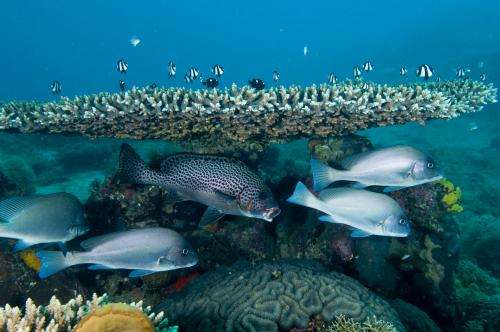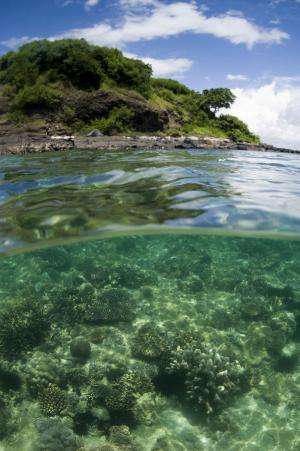450 species: Study suggests Mozambique Channel is home to second most diverse coral reefs in the world

(Â鶹ÒùÔº)—Researchers announced today that the results of a decade-long study has shown that the northern Mozambique Channel has the highest diversity of corals in the central, northern and western Indian Ocean. The researchers found that of 369 coral species identified so far in the region, sites in the northern Mozambique Channel had from 250-300 species, while sites in northern Kenya, the Gulf of Aden and the outer Seychelles islands had 200 or fewer species. The findings also suggest the total diversity of corals in the region may approach 450 species, equivalent to the Great Barrier Reef and Andaman islands, which are on the edges of the Coral Triangle, which would make the northern Mozambique Channel home to the second most diverse coral populations on the planet.
The study, published today in PLOS ONE, was undertaken by the Coastal Oceans Research and Development in the Indian Ocean (CORDIO) to determine the biodiversity and biogeographic patterns of coral reef species in the western Indian Ocean, which has been under-sampled to date. It also sought to identify how the oceanography of the region, dominated by the monsoon and equatorial currents of the Indian Ocean and recently described dynamic eddies of the Mozambique Channel, creates and sustains this core region of high diversity.
"The evolutionary lineage of the Indian Ocean fauna predates the Southeast Asia and Coral Triangle fauna, inherited from earlier marine biodiversity hotspots of 20-50 million years ago," said David Obura, lead researcher for the study. "The region's reefs have a unique heritage, and contain many unique and old lineages of corals found nowhere else on Earth."
These reefs are severely threatened, however. The Indian Ocean in general, and the Mozambique Channel in particular, face many and increasing threats & pressures from population growth, overfishing, urbanization, oil, gas and mineral exploitation, tourism development, as well as climate change.

The Ocean Health Index is a new way to express the health of marine areas in terms of the range of benefits they deliver sustainably to people, now and in the future. Compared to the global score of 60, Western Indian Ocean countries' scores ranged from 47 for the Comoros and Somalia to 73 for the Seychelles, and countries bordering the northern Mozambique Channel scored from 47 to 54 (Comoros, Madagascar, French Indian Ocean Territories, and Mozambique).
"Coral reefs fully deserve the intensive study they received in this report, owing to their key importance to the structure and function of marine ecosystems and, equally significant, to human well-being" said Steve Katona, Managing Director of the Ocean Health Index for Conservation International. "The benefits they provide to national goals captured by the Ocean Health Index, such as Food Production, Natural Products harvests, Coastal Protection against storms, Livelihoods and Economies, Tourism and Recreation, and Biodiversity are enormously important. At the same time, corals worldwide are threatened by warming sea surface temperatures, ocean acidification, pollution by chemicals, nutrients and sediment, ultraviolet light, invasion by alien species and direct habitat destruction from unsustainable fishing techniques, divers, boat anchors, coral collection or mining and dredging. Coral reefs of the Western Indian Ocean need careful management and protection if they are to realize their full potential for improving human well-being in this critical developing region."
The high level of coral diversity revealed by the researchers makes this a priority region for investments to be made by countries and the international community in ocean governance. Practical initiatives such as Seascapes for large scale marine management, and flagship ventures such as potential new World Heritage sites, can help to facilitate these investments at large scales.
"Large scale partnerships are needed to strengthen the management of the region's marine resources," said Keith Lawrence, senior director in Conservation International's marine program. "This research shows how incredibly diverse these resources are, that they supply important benefits to fishermen and the tourism sector, provide protein for local communities and protect coastlines from storms, and that they are under threat."
More information:
Learn more here:
To learn more about the Ocean Health Index, go here:
Journal information: PLoS ONE
Provided by Conservation International


















